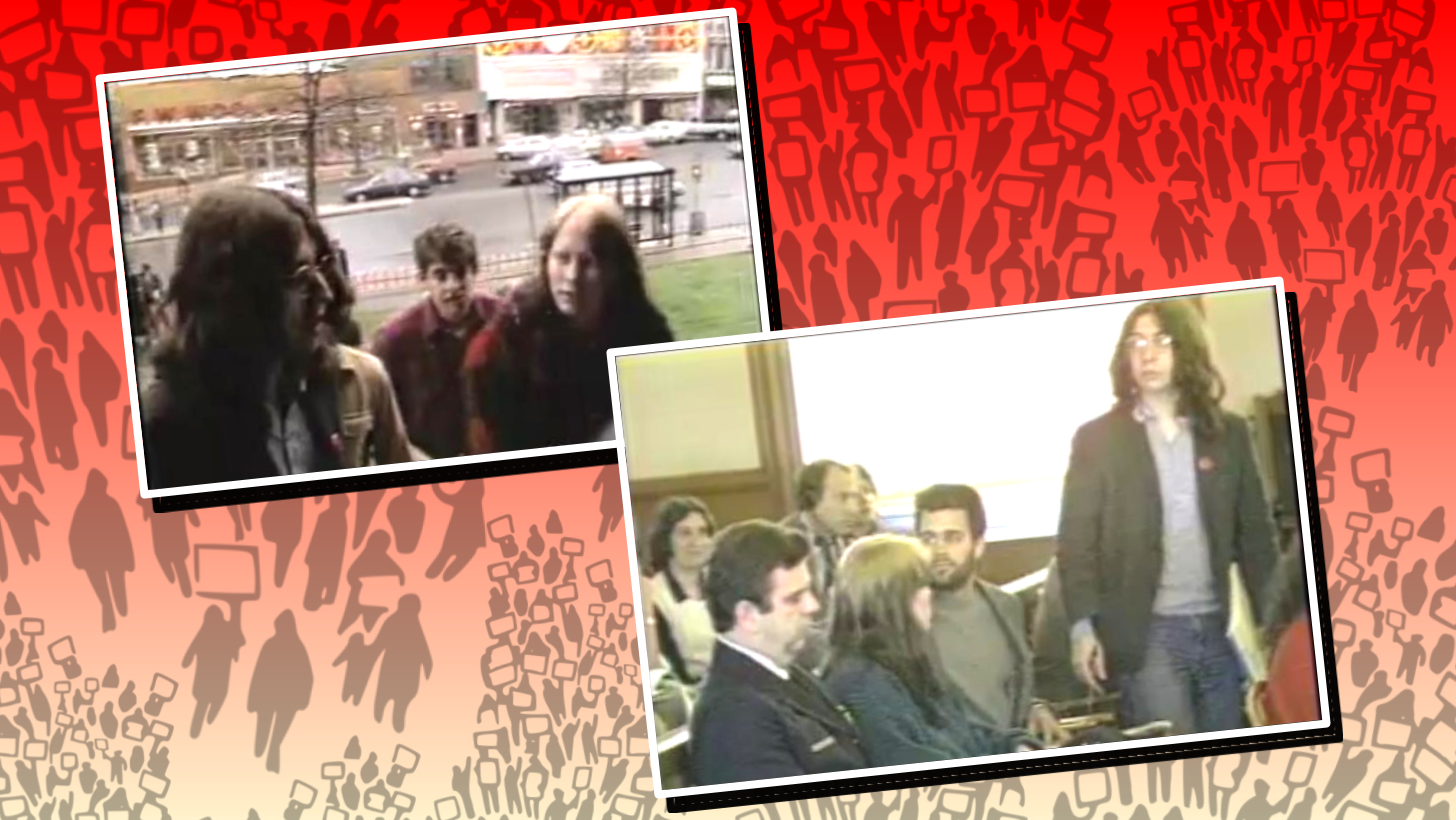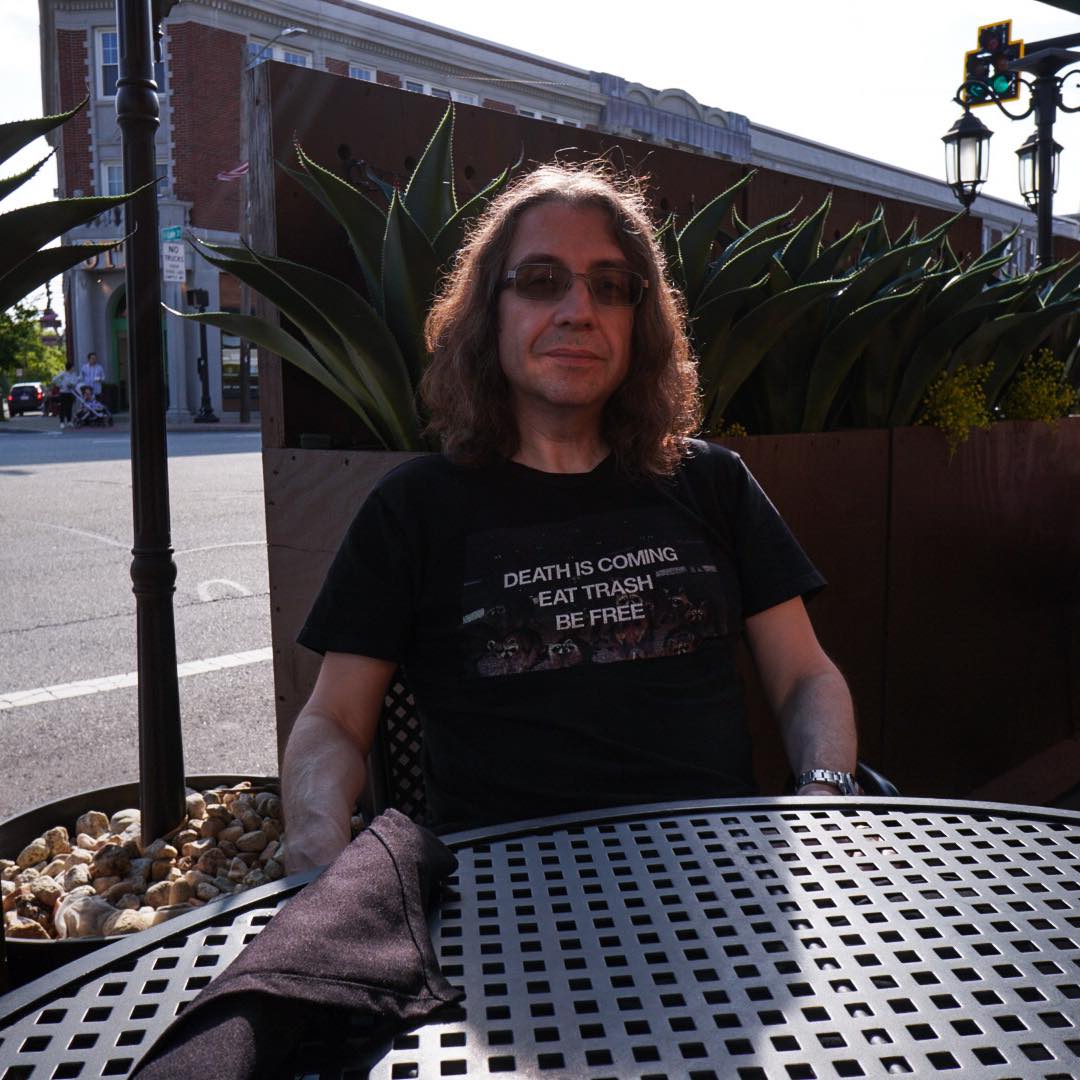IMAGE: Jason Pramas and Amy Carter at the “Northampton 15” CIA Off Campus Trial in Northampton, MA on April 8, 1987. Stills from
WGBH archival video, courtesy of the Boston TV News Digital Library.
This week, a reminder that politics is not a spectator sport. I was listening to a recent Noam Chomsky appearance on the Ralph Nader Radio Hour. And the two giants of the American left sparred a bit on particulars but agreed that humanity faces two existential threats: global warming and a revival of the nuclear arms race. Both of which I write about frequently.
When it came to the inevitable discussion of how to tackle both problems, the noted thought leaders diverged. Nader started talking about the need for a large third party to change politics. Then Chomsky retorted that the human race can’t wait long enough for Americans to get our act together. And that we must start filling the streets to demand action from the US on both threats. Linking up with increasingly vibrant campaigns abroad. The two then discussed periods like the 1980s when Americans joined the global movement for nuclear disarmament. Which was effective… to a point. Massive rallies resulted in accords like the 1987 Intermediate-Range Nuclear Forces Treaty that the Trump administration is now trying to walk away from.
This got me thinking about my own life. When I was a teenager in the early 1980s, global warming was not quite on the public radar yet. Although oil companies already knew about it, according to a landmark 2015 investigation by InsideClimate News. But the threat of nuclear war was on everyone’s mind. And the mass movement that Chomsky and Nader mentioned was strong enough to reach through the morass of the American news media of the time—which turned out to be far better than today’s in key respects—and inspire an average kid like me to act.
By the time I was 18 in the summer of 1985, I was deeply committed to the anti-nuke movement. By the time I was 22 in 1989, I was part of the early stage of the environmental movement to stop global warming. For almost 35 years all told, I have been continuously politically active. Sometimes mainly as a journalist as is currently the case, but most of the time as a foot soldier and eventual leader in all kinds of activist campaigns on the political left.
Doing politics at the street level—as I do not believe that the ballot box is its primary locus—has not been easy. It has been hard. The past three-plus decades would have been much more pleasant if I had been apolitical. I would not have been expelled from two colleges and banned from one, if I had failed to act on my beliefs. I might not have been stuck in a long series of part-time, contract, and temp jobs for much of my adult life, as my age group was the last one to have a consistent chance at finding decent long-term employment with an undergrad degree in the 1980s. My family would have been much happier with me, too, particularly during the rough patches—arrests, trials, and all that jazz.
But my life would have been less meaningful. I would have felt I was just passing through this plane of existence. A helpless leaf being blown on the winds of fate. Maybe I would have turned to alcohol and drugs like so many others I have met in the dead-end gigs I have worked. One thing’s for sure, though: I would not be able to look at myself in the mirror, as I occasionally do now, and say, “Whatever happens, I did fight.” Fellow activists and I did win some small battles for what we believe to be just causes. Even if thus far in this era, we have lost the large ones.
However, turning back to those existential battles, humanity cannot afford to lose them. There are actually many such large fights. But global warming and the threat of nuclear war loom above all of them.
Taking each in turn, the news on anthropogenic climate change just keeps getting worse and worse. Looking at just one current report, scientists writing in the February issue of the journal Nature Geoscience announced that if the global mean atmospheric carbon dioxide level—presently at 410 parts per million, and already above the predicted tipping point of 350 parts per million for several years now—goes up past 1200 parts per million (as it is expected to do by 2100 if we fail to lower carbon emissions soon), then the stratocumulus clouds over the oceans could weaken and disappear. Causing surface warming of 14 degrees Fahrenheit globally—and up to 18 degrees in the subtropics. Added to the global warming that’s already predicted, that would be lights out for human civilization. And probably for the human race.
The threat of total nuclear war, as I’ve already inferred above, remains high. The Bulletin of the Atomic Scientists’ Doomsday Clock is stuck at “two minutes to midnight” for the second year running. “Midnight” being a global nuclear conflagration. The group’s board of Nobel laureate scientists and other luminaries has not declared the clock’s time to be so close to midnight since 1953—when a hydrogen bomb was detonated by the USSR a year after the US detonated the first one during one of the most dangerous periods of the Cold War.
Both crises require swift and immediate action. And many people in the US are definitely stepping up. But many more need to join them on a regular basis. We cannot afford business as usual in the face of our impending demise.
Still, I know what most of you are thinking: You’re too busy working to make ends meet or with school or taking care of loved ones or all three of those things to join protest movements.
And I’m sympathetic to that all-too-common situation. I’ve spent most of my life juggling those very necessary activities with participation in political activist campaigns. I know it’s difficult for many people to even consider doing. But I’m asking you all to consider it nonetheless.
I’m also quite well aware that there are more immediate political crises at the local level that some of you feel can be more easily handled through politics as usual than confronting super frightening issues head-on worldwide. And I definitely concur that those “manageable” problems need to be dealt with. Though my long experience with local politics informs me that activist pressure campaigns will still be required if change is going to come fast enough to matter.
For example, let’s look at two local crises: The MBTA fare hike that was just passed yesterday according to WBUR, and the woeful lack of public housing in a state that continues to allow rents to skyrocket. After some fairly strong pushback from transportation justice groups and politicians like Boston City Councilor Michelle Wu and state Rep. Mike Connolly of Somerville, some minor modifications were made by the T’s Fiscal and Management Control Board. But fares will still be increased by an average of 6 percent. And major reforms to benefit working families were off the table. Be it the free public transit Wu has been calling for, or Connolly’s demand “for additional forms of revenues to help fund the MBTA, including taxing large businesses, wealthy individuals and hiking fees on Uber and Lyft.”
Meanwhile, the Mass association of local housing authority officials is greeting the news of a new report showing that 160,000 people are now on public housing waiting lists across the Commonwealth with dismay, according to State House News Service. Since the state budget for public housing only just went up to $64.5 million this fiscal year after six years of level funding, and housing authority advocates say it would require a budget of at least $120 million a year to expand Mass public housing to meet current needs. Though likely not future needs.
It’s absolutely true that action on such local policy crises is vital. And it’s just as true that, as with the life or death fights at the global level, we’re not going to see the kind of government action needed to really solve our housing or transportation problems in the Bay State without much larger protest campaigns than those that are already happening. Because, as Frederick Douglass once put it, power concedes nothing without a demand.
All of which is to say that we’ve got to get back to a place where we were in the US in the 1930s and 1960s (and the conclusion of that “long decade” in the 1970s) when millions of people went into the streets to protest crises large and small… and stayed there, despite all the hardships that come with concerted political activity until they won major victories. Be it Social Security, the National Labor Relations Act, the Civil Rights Act, the Environmental Protection Act, Title IX of the Education Amendments Act, or putting an end to the Vietnam War, grassroots activists pushed the government at all levels and the corporations that have dominated them for over a century… until they gave in. Nothing is perfect, least of all big political movements, but they won real reforms that lasted for decades.
And that’s what has to happen now. A culture of popular resistance must flower. Sparking movements for peace, justice, democracy, and ecology that will make Occupy and Black Lives Matter look like walks in the park. At the planetary level, the alternatives to mass nonviolent direct action are too grim to contemplate. At the local level, failure to act means that our communities will continue to deteriorate until the haves completely decouple from the have-nots—and democracy dies in shadow. Shortly before the biosphere does.












